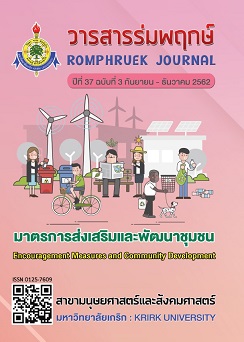Management for the Sustainability of the Listed Companies in the Stock Exchange of Thailand
Main Article Content
Abstract
The purpose of this research was to study the variable factors in relation to management policies, leadership, culture, organisation atmosphere, operations management the factors influencing the sustainability of listed companies in the Stock Exchange of Thailand, using mixed methods research, starting from quantitative research that is then confirmed through qualitative research. Population consisted of shareholders, experts, management and employees using questionnaire as tool, the analysis was done by descriptive statistics and structural equation modelling, in depth interview and content analysis, the research results revealed that management policy comments and organisation sustainability are at a moderate level. Comments on organisation leadership, organisation culture, organisation atmosphere and management are at a high level.
The analysis of structural equation modelling for modified relationships found harmony in empirical data, from the harmony index. The results from the tests of 12 hypotheses mostly match what had been set, except for the eighth hypothesis, which was that organisation culture doesn’t have a direct positive influence on management. Interviews with experts confirmed that organisation culture and leadership plays an important role in the success or failure of the organisation. The management policy is the factor that makes business perform well in accordance with plans, and leads to success. Developing a working atmosphere makes each person aware and have a better attitude towards the organisation, resulting in work satisfaction commitment and building the sustainability of the organisation. The organisation’s management should maximise social benefits, and manage development approaches transparently, taking into account the community and society, by creating innovative products that are environmentally friendly. All of these factors will result in the better performance and sustainability of the companies listed in the Stock Exchange of Thailand.
Article Details
Every article published in the Romphruek Journal of the Humanities and Social Sciences is the opinion and point of view of the authors. Thery're not the viewpoint of Krirk University or the editored department. Any part or all of the articles for pablication must be clearly cited.
References
กัลยา วานิชย์บัญชา. (2546). การใช้ SPSS for windows ในการวิเคราะห์ข้อมูล.
กรุงเทพ : สำนักพิมพ์แห่งจุฬาลงกรณ์มหาวิทยาลัย.
Anees Ullah Karamat. (2013). Impact of Leadership on Organizational Performance. D & R Cambric Communication Business Economics and Tourism. Vaasan Ammattikor-keakoulu University
of applied sciences. Finland.
Ben-David, J. (1975). On the traditional morality of science. News letter of the Program on Public
Conceptions of Science, 13, 24–36.
Bourletidis, K., & Triantafyllopoulos, Y. (2014). SMEs Survival in Time of Crisis : Strategies, Tactics and
Commercial Success Stories, Department of Business Administration University of Aegean, Lesbos Greece .
Eustace, A., & Martins, N. (2014). The role of leadership in shaping organisational climate : An example
from the fast moving consumer goods industry. SA Journal of Industrial Psychology, 40(1), 2-3.
Farvar, M. T., & Milton, J. P. (1972). The careless technology : Ecology and international development.
NY USA : Doubleday.
Forehand and Gilmer. (1964). Environmental variations in studies of organisational behavior.
Psychological bulletin, 62(6), 361-382
Hair, J. F., Black, W. C., Babin, B. J., Anderson, R. E., & Tatham, R. L. (2006). Multivariate data analysis.
Upper Saddle River NJ : Prentice Hall.
Hsu, M. L. A. and Chen, F. H. (2017). The Cross-Level Mediating Effect of Psychological Capital on the Organizational Innovation Climate–Employee Innovative Behavior Relation -ship .
The Journal of Creative Behavior, 51(2), 128–139.
Jung, D. I.; Chow, C.; Wu, A. (2003). The role of transformational leadership in enhancing organizational
innovation : Hypotheses and some preliminary findings. The Leadership Quarterly, 14(4-5), 525–544.
Li, Z.; Li, X.; Hui, Y.; Wong, W.-K. (2018). Maslow Portfolio Selection for Individuals with Low Financial Sustainability. Sustainability , 10(4), 1-11.
Miklovich, P. A. (2014). Stakeholders' perception of legitimacy and the impact on the
organizational sustainability strategy of federally qualified health.
Faculty of History Lawrence Technological University, Michigan, USA.
Morris, D. (2016). What does corporate social responsibility mean to fortune-500 companies
and why? A 2015 CSR audit of the top 25 fortune-500 companies. ( January 6, 2019) Retrieved from https://surface.syr.edu/cgi/viewcontent.cgi?article=1478 &context =etd.
Mou, W.; Wong, W. K .; McAleer, M. (2018). Financial credit risk evaluation based on core enterprise
supply chains. Econometric Institute, Erasmus University, Rotterdam, Netherlands.
Nastasi, B. K. and Schensul, S. L. (2005). Contributions of qualitative research to the validity of
intervention research. Journal of School Psychology, 43(3), 177-195.
Price water house Coopers. (2014). Megatrends. (February 10, 2017) Retrieved from
https://www.pwc.co.uk/issues/megatrends.html.
Riaz, A. and Haider, M. H. (2010). Role of Transformational and Transactional Leadership on
Job Satisfaction and Career Satisfaction. Business and Economic Horizons, 1, 29-38.
Sergiovanni, T. J., & Starratt, R. J. (1983). Supervision : Human perspective.
New York : McGraw-Hill Book Company.
Tsendsuren, S.; Li, C.-S.; Peng, S.-C.; Wong, W.-K. (2018). The Effects of Health Status on Life
Insurance Holdings in 16 European Countries. Sustainability, 10(10), 1-30.
Weick, K. E. (1969). The social psychology of organizing. Boston USA : Addison-Wesley.
Wong, W.-K.; Lean, H.; McAleer, M.; Tsai, F.-T. (2018). Why Are Warrant Markets Sustained in Taiwan but
Not in China?. (January 15, 2019) Retrieved from https://www.mdpi.com/2071-1050/10/10/3748/pdf.
Xiong, J. (2016). Understanding the role of information technology for sustainable development in
small businesses and micro-enterprises. (January 10, 2019) Retrieved from
https://digitalcommons.unomaha.edu/studentwork/2910/.
Yukl, G. A. (1998). Leadership in organizations. London UK : Pearson Education, Inc.
Nancy A. Toscano. (2015). Understanding the Impact of Leadership and Organizational Culture on Nonprofit Employees Commitment and Turnover Intention. Graduate school Virginia Commonwealth University, USA.
Lu. (2013). Effects of Emotional Labor and Job Satisfaction on Organizational Citizenship Behav -iors : A Case Study on Business Hotel Chains. International Journal of Organizational Innovation, 54, 165-176.


